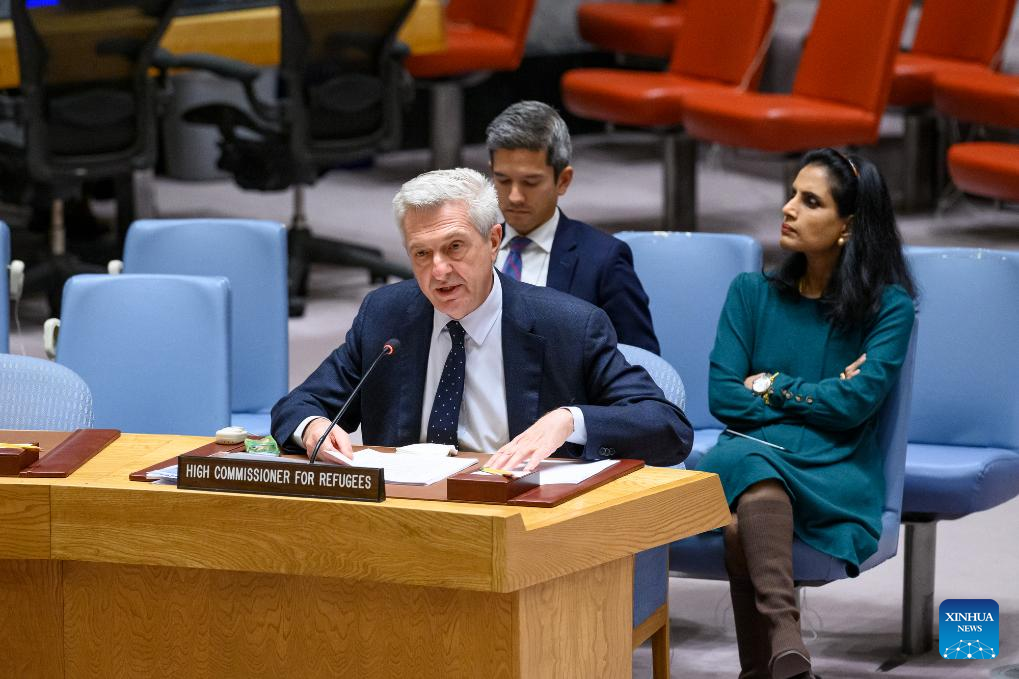
UN High Commissioner for Refugees Filippo Grandi (Front) speaks at a Security Council meeting at the UN headquarters in New York, on Oct. 31, 2023. Grandi on Tuesday called for unity of the UN Security Council to tackle refugee crises around the world. (Loey Felipe/UN Photo/Handout via Xinhua)
UNITED NATIONS, Oct. 31 (Xinhua) -- UN High Commissioner for Refugees (UNHCR) Filippo Grandi on Tuesday called for unity of the UN Security Council to tackle refugee crises around the world.
There are 114 million refugees and displaced people around the world, he told the Security Council in an annual briefing. "This is surely a tangible but sometimes neglected symptom of the world's current extreme disorder."
Each new refugee crisis seems to push the previous ones into dangerous oblivion, but they stay, Grandi said.
"And let this lifelong humanitarian worker say that we need your voice to address each one of them ... your strong, united voice, carrying the authority which the (UN) Charter vests in this council, but which the world does not hear anymore, drowned as it is in rivalries and divisions," he said.
Grandi noted that the lack of unity among Security Council members on the refugee issue is unacceptable.
"From where I sit, this has become difficult to understand. As a believer in multilateralism and in the role of the United Nations, I simply cannot accept it," he said.
The gravity of this moment cannot be overstated, he said. "Will you continue to allow this jigsaw of war to be completed by aggressive acts, by your disunity, or by sheer neglect? Or will you take the courageous and necessary steps back from the abyss?"
Grandi called for efforts to resolve conflicts as forced displacement is also a consequence of the failure to uphold peace and security and as brutal conflict continues to be its main driver.
The past three weeks in Gaza have provided devastating proof that disregarding the basic rules of war -- international humanitarian law -- is increasingly becoming the norm and not the exception, with innocent civilians killed in unprecedented numbers, he said.
"A humanitarian cease-fire coupled with substantive delivery of humanitarian aid inside Gaza can at least stop this spiral of death and I hope that you will overcome your divisions and exercise your authority in demanding one. The world is waiting for you to do so," he said. "But one must hope that a cease-fire becomes the first step toward embarking again -- finally -- on the path toward a solution."
There will be no peace in the region, and in the world, without a just solution to the Israeli-Palestinian conflict, including the end of the Israeli occupation, Grandi said.
Humanitarians are asked to keep going for longer and to try to hold more things together, while little political capital is spent on making peace, he said.
"And on top of this, we are being asked to do more with less. ... UNHCR alone urgently needs 600 million U.S. dollars before the end of the year, and prospects for next year are dismal, with big donors cutting aid and others, who could help, not engaging in multilateral support," he said.
The UN Agency for Palestine Refugees has been left chronically underfunded. The World Food Programme, the UN Children's Fund, and the International Committee of the Red Cross all face the same financial crunch in their humanitarian activities, he said.
"So we prioritize and reprioritize. We cut rations, shelter, and staff, hoping to maintain a lifeline to those in need. But in many places that lifeline is becoming thinner by the day. Being alone, being exposed, being short of resources make me wonder for how much longer we can continue. Humanitarians are tough. But humanitarians are near a breaking point. And what will you be left with, when they have to go?" Grandi asked. ■



